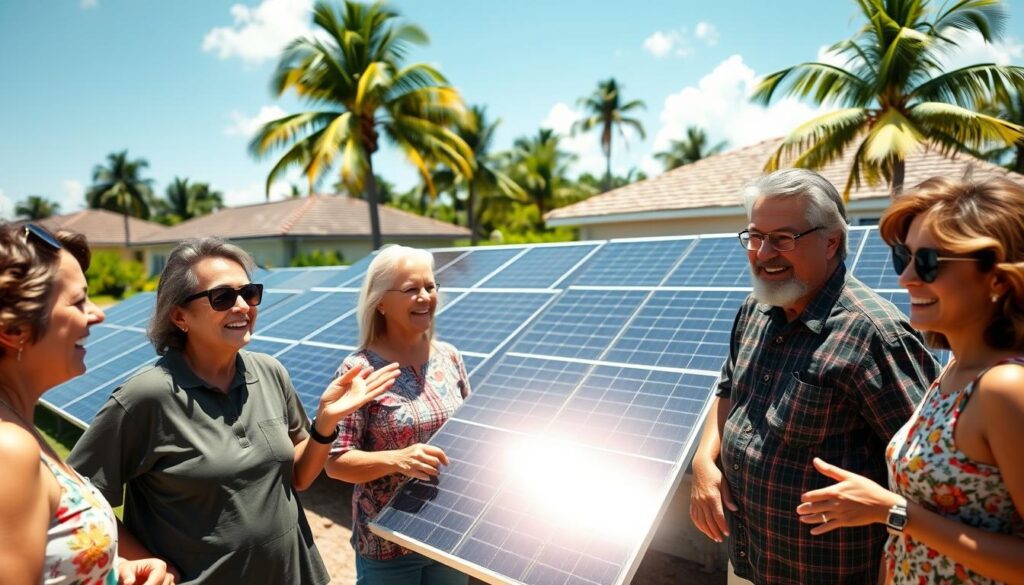Florida homeowners can slash energy costs and boost savings with solar panel credit florida programs. The florida solar panel tax credit combines federal and state incentives to make going solar affordable. With a 30% federal tax credit and Florida’s sales tax exemption, installation costs drop instantly. Net metering policies let you earn credits for extra energy sent back to the grid, while property tax exemptions keep bills low. Now is the perfect time to start saving.
These programs reduce upfront costs by up to 50%, making solar accessible for all budgets. Systems can generate up to 2,600W with panels like EcoFlow Rigid, maximizing energy production. Loans like PACE and SELF’s low-interest options let you install without upfront cash. Over 20 years of free energy after repayment means long-term savings.
Key Takeaways
- The solar panel credit florida includes a 30% federal tax credit as of 2023.
- Florida’s property tax exemption keeps bills steady while boosting home value.
- Net metering pays full retail rates for excess energy sent to the grid.
- Combined incentives cut installation costs by up to 50%.
- Systems can save $7,560 yearly on average after credits and rebates.
What is the Solar Panel Credit in Florida?
Florida leads the nation as the third-largest solar market, with many homeowners taking advantage of solar tax credits florida to reduce costs. These incentives simplify the transition to clean energy by lowering upfront expenses.
Understanding the Basics of Solar Tax Credits
Solar tax credits florida differ from rebates or deductions. The key federal incentive is the Solar Investment Tax Credit (ITC), which covers 30% of system costs through 2032. Unlike deductions, credits directly reduce taxes owed dollar-for-dollar.
Eligibility Criteria for Solar Panel Credit
- Must be a Florida homeowner installing panels on primary residence
- Solar systems must meet IRS requirements (e.g., panels certified by the Solar Energy Industries Association)
- Tax liability must exceed credit amount to realize full benefit
How the Credit Works for Homeowners
| System Cost | Federal Tax Credit | Estimated Savings |
|---|---|---|
| $25,200 | $7,560 | $17,640 net cost |
Example: A $30,000 2025 system gets a $9,000 credit. If owed $15,000 in taxes, the credit reduces liability to $6,000. Unused portions roll over for up to five years.
Florida adds extra perks like 100% property tax exemption for solar systems and 6% sales tax exemption. Combined with net metering policies from utilities like Florida Power & Light, these incentives create tangible savings. Homeowners save an average of $250 annually through property tax exemptions alone.
Benefits of Using Solar Energy in Florida
Florida’s sunny climate and supportive incentives make solar energy a smart choice for homeowners. From cutting costs to boosting property value, the advantages are clear. Let’s break down why switching to solar makes sense for the Sunshine State.

Environmental Impact of Solar Energy
Florida’s 230 annual sunny days mean solar systems generate clean energy year-round. By reducing reliance on fossil fuels, homeowners help lower carbon emissions. This shift is critical in a state facing rising sea levels and extreme weather linked to climate change. Every solar installation reduces the need for coal or gas-powered electricity, protecting both ecosystems and communities.
Financial Benefits of Solar Investment
- Instant savings: Florida solar energy incentives like the 30% federal tax credit cut upfront costs. A $10,500 system drops to $7,350 after credits.
- Long-term gains: Over 25 years, a 5kW system can save $69,799 on utility bills. With net metering, excess energy sold back to the grid adds extra savings.
- No tax penalties: Solar upgrades don’t increase property taxes under Florida’s renewable energy property tax exclusion.
Increase in Property Value
Real estate data shows solar panels boost home values by up to 4.1%. Buyers prioritize energy efficiency, and systems pay for themselves faster in Florida’s high-sunlight environment. Even after the 10-year payback period, homes with solar sell faster and command premium prices in competitive markets.
How to Apply for the Solar Panel Credit
Applying for Florida’s solar panel credit florida starts with choosing a qualified installer. This guide breaks down each step to ensure you maximize your savings without confusion.
Step-by-Step Application Process
- Pick an IRS-certified solar provider in Florida. They’ll handle most forms and ensure compliance with state rules.
- Install qualified equipment like solar panels or battery storage (minimum 3 kWh capacity for 2023+ systems).
- Track costs: Include panel purchases, labor, and installation fees. Exclude rebates or utility subsidies.
- File IRS Form 5695 with your federal tax return for the year of installation.
- Keep records for three years post-filing to verify compliance.
Important Documentation Required
- Completed Form 5695 (must accompany your tax return)
- Itemized receipts from your installer
- Certification documents from the Solar Rating Certification Corporation
- Proof of installation dates and compliance with Energy Star standards
Deadlines and Timelines
Install by December 31, 2032 to lock in the full 30% credit. Projects after 2032 face phased reductions: 26% in 2023, 22% in 2024. Federal tax filings must occur by April 15 the year after installation. Installers in Florida recommend starting projects 3-6 months before deadlines to avoid seasonal delays.
Don’t wait—Florida’s solar incentives expire permanently after 2034. Let your installer guide you through deadlines tied to your specific system type and location.
Common Myths About Solar Panel Credits
Sorting fact from fiction helps Floridians make smart energy choices. While solar panel rebates florida programs vary by region, local incentives like Broward Solar Co-op and Orlando Solar Co-op cut costs through group pricing. Let’s clear up the most persistent myths.
Cost Misconceptions
- Myth: “Solar is too expensive.”
- Fact: Prices dropped 50% since 2010, and the 30% federal tax credit lowers a $20,000 system to $14,000.
- Myth: “No rebates exist in Florida.”
- Fact: 6% sales tax exemption and local solar panel rebates florida programs offset upfront costs.
Installation & Maintenance Myths
Many worry about Florida’s weather and HOA rules. In reality:
- Solar panels withstand hurricane winds when installed properly.
- Florida law protects homeowners’ right to install solar, overriding restrictive HOA clauses.
- Cleaning twice a year keeps systems running at 95% efficiency.
Effectiveness Myths
“Florida’s humidity and storms don’t hinder solar. Panels work in cloudy conditions, producing 10-25% of peak output.” – National Renewable Energy Lab
Myth: “Solar doesn’t work when it’s cloudy.” Fact: Modern panels generate power even in less-than-ideal conditions. Florida’s 25-year panel lifespan ensures long-term savings despite occasional storms.
Don’t let myths hold you back. Explore solar panel rebates florida opportunities and verified savings through local programs. Your home’s energy future starts with separating fact from fiction.
Incentives Beyond the Tax Credit
Florida’s florida solar incentives extend far beyond federal tax breaks. Residents can explore rebates, low-interest loans, and specialized programs to maximize savings. These solar power incentives in florida simplify the transition to renewable energy without straining budgets.

Local Rebates and Financial Programs
Utilities like FPL, TECO, and Duke Energy offer rebates. For example:
| Utility | Rebate Details |
|---|---|
| Boynton Beach Energy Edge | $1,500 for systems over 5kW |
| Dunedin Solar Program | $0.25/watt, max $2,500 |
| Clay Electric | $0.01/BTU for solar water heaters, up to $600 |
Financing Options
Florida’s florida solar incentives include:
- PACE Loans: Repaid via property taxes, no upfront costs
- SELF Loans: Rates from 7.99%–8.25%, terms 3–10 years
- Interest-Free Loans: Up to $5,000 from Lakeland Electric
Federal Tax Credits
The solar power incentives in florida also include the Federal Solar Investment Tax Credit (ITC), which covers 30% of installation costs until 2032. For a $24,000 system, this saves $7,200 directly off taxes owed.
“Solar systems may increase home value by 4%,”—Zillow, 2023
Combined with state exemptions—like waived sales tax ($1,440 saved) and property tax protection—these incentives create a powerful savings package. Explore local utility websites or consult installers to align rebates, loans, and credits for optimal savings.
Choosing the Right Solar Panel System
Florida’s sunny climate makes it ideal for solar energy, but choosing the right system requires careful planning. Start by evaluating best solar panels for florida residents based on performance and durability. Monocrystalline panels, with 18-22% efficiency, excel in high-heat conditions, while polycrystalline options offer cost-effective solutions. Thin-film panels are lightweight but less efficient, making them ideal for limited-space roofs.
Compare Panel Types for Florida’s Climate
| Type | Efficiency | Lifespan | Best For |
|---|---|---|---|
| Monocrystalline | 18-22% | 25+ years | Hot climates, space-constrained roofs |
| Polycrystalline | 15-17% | 20-25 years | Budget-friendly installations |
| Thin-Film | 10-13% | 10-20 years | Temporary or lightweight structures |
Key Factors for Selection
- Weather resilience: Ensure panels meet Florida’s hurricane wind standards (140+ mph).
- Efficiency: Prioritize high-efficiency panels in humid areas to maximize energy output.
- Aesthetic needs: Choose panels with sleek designs to blend with rooflines.
Find Trusted Installers
Research buy solar panels in florida through certified installers like Solar Energy World. Ask for proof of licenses via the Florida Solar Energy Center. Top installers should provide warranties covering performance and labor. Avoid companies requesting full payment upfront—many offer payment plans or PACE financing.
Florida’s sunny climate demands panels that withstand heat and humidity. Monocrystalline options often top recommendations due to their longevity. Pairing with brands like Tesla Powerwall ensures reliable storage solutions. Always verify installer reviews and state certifications to protect your investment.
Maintenance and Longevity of Solar Panels
Maintaining your solar panels ensures they work efficiently for decades, maximizing benefits like the solar panel credit florida offers. Regular upkeep helps preserve energy output and tax incentives over time. 
Routine Maintenance Tips for Homeowners
Florida’s climate demands smart care. Clean panels twice a year, especially after storms or pollen season. Coastal residents should rinse salt buildup monthly to prevent corrosion. Secure panels to withstand hurricane-force winds—most are rated for 140+ mph. Trim nearby trees to avoid shading.
Understanding Lifespan and Warranties
Most panels last 25–30 years, losing just 0.5–1% efficiency yearly. Manufacturer warranties guarantee 80% output after 25 years. Florida law requires installers to honor warranties for at least 10 years. Combine these with the solar panel credit florida for long-term savings.
How Performance Affects Savings
Well-maintained systems retain 75–90% efficiency over 25 years. This means steady savings from the 30% federal tax credit and Florida’s net metering program. Clean panels = more energy produced, so keep them clear of debris and salt. Regular checks ensure warranties stay valid, protecting your investment.
Real-Life Success Stories from Florida Residents
Florida’s florida solar incentives are transforming homes across the state into energy-efficient success stories. From urban condos to rural ranches, residents are cutting energy bills and boosting home values. Here’s how real Floridians are making it work.

Case Studies of Effective Solar Solutions
Explore these regional examples showcasing solar’s impact:
| Region | Annual Savings | Incentives Used |
|---|---|---|
| Miami-Dade | $1,800+ saved yearly | 30% Federal ITC + local rebates |
| Orlando | 50% lower energy costs | Florida PACE financing + utility discounts |
| Panama City | $2,200+ saved over 5 years | Solar Renewable Energy Credits (SRECs) + state grants |
Testimonials Highlighting Financial Savings
- “After installing panels, our $300 bills dropped to $30 a month. The florida solar incentives covered 40% of costs!” – Tampa homeowner Maria Lopez
- “We saved $15,000 in 10 years thanks to the ITC and SRECs.” – Sarasota family
Community Impact of Solar Panel Adoption
Across the state, neighborhoods are uniting:
“Solar co-ops in Gainesville cut installation costs by 25% for members.” – City Sustainability Office
Communities like Tallahassee use PACE financing to fund group installations, spreading savings widely. Over 12,000 households now participate in shared programs, proving solar isn’t just a personal choice—it’s a community game-changer.
The Future of Solar Energy in Florida
Florida’s solar landscape is poised for even brighter days ahead. As policies evolve and technology advances, homeowners can expect new opportunities to harness clean energy affordably. Let’s explore what’s next for solar in the Sunshine State.
Recent Legislative Changes Affecting Solar Credits
Florida continues refining its solar incentives. While the state doesn’t offer income tax credits, federal programs like the 30% Residential Renewable Energy Tax Credit (RCEC) remain available until 2032. State laws also keep solar equipment sales tax-free, easing upfront costs. Utilities like Florida Power & Light are adapting net metering policies, ensuring homeowners benefit from selling excess energy back to the grid at fair rates.
Emerging Technologies in Solar Power
Innovation is key to Florida’s solar future. New hurricane-resistant panels and smart inverters are designed to withstand severe weather. Battery storage systems, like those from Tesla and SunPower, now pair seamlessly with rooftop installations, storing power during outages. Even panel efficiency gains mean systems perform better in Florida’s humid climate, maximizing energy output.
Predictions for Solar Growth in Florida
Experts project Florida’s solar capacity to triple by 2030, driven by falling installation costs and rising demand. With 237 sunny days annually, the state’s potential remains untapped. Solar financing options florida offer flexible payment plans, including PACE loans and zero-down programs, making systems accessible for more families. As the industry grows, job numbers are expected to rise, supporting over 15,000 positions by 2025.
Whether you’re ready to install panels today or planning for the future, now is the time to explore solar financing options florida. With federal credits still active and local programs expanding, the path to energy independence has never been clearer—or more affordable.
